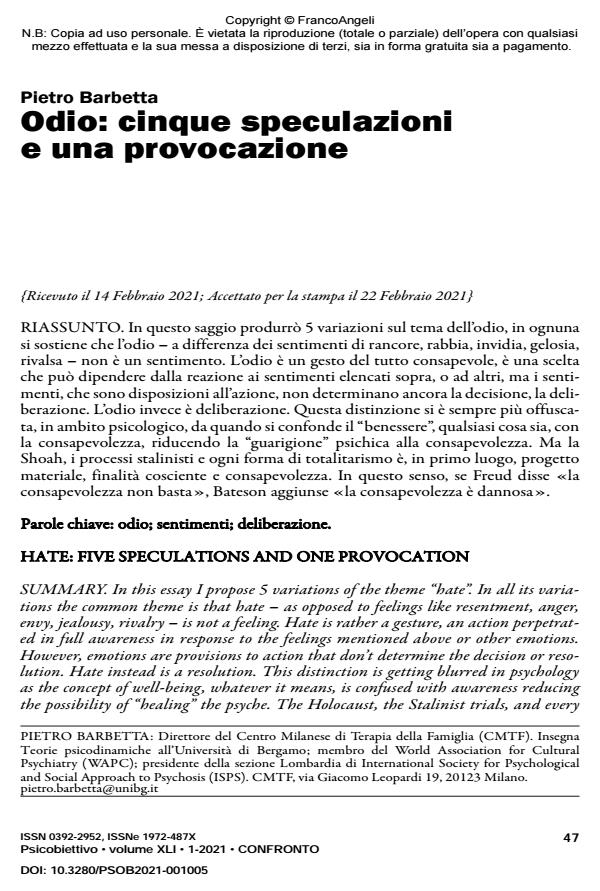Hate: five speculations and one provocation
Journal title PSICOBIETTIVO
Author/s Pietro Barbetta
Publishing Year 2021 Issue 2021/1
Language Italian Pages 12 P. 47-58 File size 138 KB
DOI 10.3280/PSOB2021-001005
DOI is like a bar code for intellectual property: to have more infomation
click here
Below, you can see the article first page
If you want to buy this article in PDF format, you can do it, following the instructions to buy download credits

FrancoAngeli is member of Publishers International Linking Association, Inc (PILA), a not-for-profit association which run the CrossRef service enabling links to and from online scholarly content.
In this essay I propose 5 variations of the theme "hate". In all its variations the common theme is that hate - as opposed to feelings like resentment, anger, envy, jealousy, rivalry - is not a feeling. Hate is rather a gesture, an action perpetrated in full awareness in response to the feelings mentioned above or other emotions. However, emotions are provisions to action that don’t determine the decision or resolution. Hate instead is a resolution. This distinction is getting blurred in psychology as the concept of well-being, whatever it means, is confused with awareness reducing the possibility of "healing" the psyche. The Holocaust, the Stalinist trials, and every type of totalitarianism, are, first of all, material projects of conscious purpose. Freud claimed: «awareness is not enough», and Gregory Bateson added: «awareness is harmful».
Keywords: Hate; feelings; deliberation.
- Adorno T.W., Frenkel-Brunswik E., Levinson D., Sanford N. (1950) The Authoritarian Personality, J. & J. Harper, New York
- Barazzetti A. (2021) Violenza: una lettura sistemica, Mimesis, Milano
- Barbetta P. (2005) “La ética de Caín. Análisis del discurso sobre la violencia entre midrash y charla terapeutica”, Sistemas Familiares, 21: 5-16, Asociación de Psicoterapia Sistémica de Buenos Aires, Buenos Aires
- Barbetta P. (2016) “Anders Breivik, una persona normale”, Doppiozero. -- https://www.doppiozero.com/rubriche/336/201606/anders-breivik-una-persona-normale
- Barbetta P. (2021) “The oral Deleuze. Faciality, Power, Sexuality, Objectile and Superject”, European Journal of Psychotherapy and Counselling, in press Bataille G. (1976) Il limite dell’utile (trad. it.: Adelphi, Milano, 2000)
- Baudrillard J. (1980) Lo scambio simbolico e la morte, Feltrinelli, Milano
- Bauman Z. (2010) Modernità e Olocausto, Il Mulino, Bologna
- Burkert W. (1972) Homo Necans, Walter de Gruyter e Co., Berlin
- Freud S. (1930-38) “L’uomo Mosè e la religione monoteista, 1934-38”, in Opere, 11, Bollati Boringhieri, Torino
- Girard R. (1972) La violenza e il sacro, Adelphi, Milano
- Horkheimer M. (1976) Studi sull’autorità e la famiglia, UTET, Torino
- Horkheimer M., Adorno T. (1966) Dialettica dell’Illuminismo, Einaudi, Torino
- JPS (1999-5759) Tanakh, The Jewish Publication Society, Philadelphia
- Levi P. (1986) I sommersi e i salvati, Einaudi, Torino
- Lo Verso G. (2012) La mafia dentro, FrancoAngeli, Milano
- Meghnagi D. (2018) Jewish Libia, Memory and Identity in Text Image, Syracuse University Press, Syracuse (NY)
- Morin E. (1973) Le paradigme perdu: la nature humaine, Seuil, Paris
- Nietzsche F. (1887) Genealogia della morale (trad. it.: Adelphi, Milano, 2013)
- Sartre J.P. (1943) L’tre et le Néant, Gallimard, Paris
- Seierstad Ä. (2016) Uno di noi, Rizzoli, Milano
- Steiner R. (2011) “In All Questions, My Interest Is Not in the Individual People but in the Analytic Movement as a Whole. It Will Be Hard Enough Here in Europe in the Times to Come to Keep It Going. After All We Are Just a Handful of People Who Really Have That in Mind…”, The International Journal of Psychoanalysis, 92, 3: 505/591. DOI 10.1111/j.1745-8315.2011.00449.x
- Whitehead A.N. (1929) Process and Reality,Macmillan, London Zaretski E. (2006) I misteri dell’anima. Una storia sociale e culturale della psicoanalisi, Feltrinelli, Milano
Pietro Barbetta, Odio: cinque speculazioni e una provocazione in "PSICOBIETTIVO" 1/2021, pp 47-58, DOI: 10.3280/PSOB2021-001005